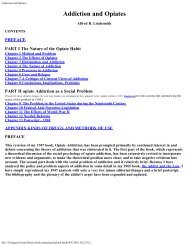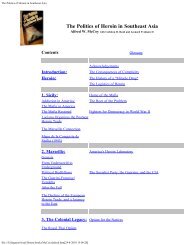opium and the people
opium and the people
opium and the people
You also want an ePaper? Increase the reach of your titles
YUMPU automatically turns print PDFs into web optimized ePapers that Google loves.
<strong>the</strong> ideology of <strong>opium</strong>: <strong>opium</strong> eating as a disease<br />
on <strong>the</strong> same level dose of <strong>the</strong> drug, had been accepted unquestioningly even by <strong>the</strong> earlier medical writers on <strong>the</strong><br />
subject. In fact, <strong>the</strong> whole debate on <strong>opium</strong> eating <strong>and</strong> longevity had presupposed <strong>the</strong> existence of just such a class of<br />
addict. But disease <strong>the</strong>ories encompassed <strong>the</strong> moderate as much as <strong>the</strong> uncontrolled addict. Allbutt himself, who had<br />
had a patient who took a grain of <strong>opium</strong> every morning <strong>and</strong> evening for <strong>the</strong> last fifteen years of his life <strong>and</strong> who was<br />
`never ... so presumptuous as to endeavour to suppress' <strong>the</strong> habit, never<strong>the</strong>less concluded that `<strong>the</strong> familiar use of<br />
<strong>opium</strong> in any form is to play with fire, <strong>and</strong> probably to catch fire' .26<br />
Views like his were not unquestioningly accepted. Discussion of moderate addicts was conspicuous in debates over <strong>the</strong><br />
IndoChinese <strong>opium</strong> trade; <strong>the</strong>re is evidence that many doctors agreed with <strong>the</strong> opinion of Dr C. R. Francis in 1882. Dr<br />
Francis quoted <strong>the</strong> case of a friend who was a stable addict. `Yielding to <strong>the</strong> popular prejudice against <strong>opium</strong>-eating,<br />
Mr A. has repeatedly endeavoured to break it off ... Doubtless he would succeed in time, as o<strong>the</strong>rs have, but cui bono?<br />
He enjoys excellent health, is able to do a good day's work (mental as well as physical), <strong>and</strong> is entirely free from a<br />
variety of minor troubles having a nervous origin which used to annoy him before he began <strong>the</strong> <strong>opium</strong>.'27 Moderate as<br />
much as uncontrolled addicts were equally diseased. Medical intervention was appropriate even if, as many of <strong>the</strong> case<br />
histories demonstrated, <strong>the</strong> addict lived a normal life in every o<strong>the</strong>r respect.<br />
Disease <strong>the</strong>ories, far from marking a step towards greater scientific awareness <strong>and</strong> analysis of <strong>the</strong> roots of dependence<br />
on narcotics, in many respects marked a closing of avenues, a narrower vision than before. The <strong>the</strong>ories <strong>the</strong>mselves<br />
were a hotch-potch of borrowings from developing medical science <strong>and</strong> established morality. The lack of definition of<br />
<strong>the</strong> term `addiction' itself emphasized this. Even by <strong>the</strong> early years of <strong>the</strong> twentieth century, few specialists cared to use<br />
<strong>the</strong> term. Dr Huntley did so. O<strong>the</strong>rs still used `inebriety', morphinomania, morphinism or <strong>opium</strong> eating; <strong>the</strong> morphia<br />
habit <strong>and</strong> morphia habitues were common. Drug or morphine addiction was not in wider usage until <strong>the</strong> years before<br />
<strong>the</strong> First World War. Specialists in inebriety disseminated a confused <strong>and</strong> illogical series of opinions masquerading as<br />
<strong>the</strong>ory. A continuing belief in free will <strong>and</strong> individual responsibility coexisted uneasily with <strong>the</strong> model of disease <strong>and</strong><br />
infection which doctors sought to impose. The condition could be self-induced <strong>and</strong> yet also be <strong>the</strong> result of hereditary<br />
defect; it was never<strong>the</strong>less somehow still, in medical eyes, a doctor's proper responsibility._ Morality <strong>and</strong> medical<br />
science should apparently have been at odds; yet disease <strong>the</strong>ory was very much a mixture of <strong>the</strong> two. The addict's<br />
sickness was mental; his `neurosis' was in effect a deviation from <strong>the</strong> norms of established society, even though<br />
doctors rigorously excluded <strong>the</strong> social dimensions of addiction from <strong>the</strong>ir own disease formulation.<br />
Disease <strong>the</strong>ory had its effect, too, on methods of treatment. It was, in fact, <strong>the</strong> elaboration of such medical attitudes to<br />
addiction which, of necessity, entailed a parallel emphasis on control <strong>and</strong> cure of <strong>the</strong> addict. In <strong>the</strong> first half of <strong>the</strong><br />
century, in <strong>the</strong> absence of any developed disease view, <strong>the</strong> question of treatment had barely been considered, although<br />
Christison <strong>and</strong> those who saw <strong>opium</strong> eating as compatible with longevity also saw nothing inhumane in abrupt <strong>and</strong><br />
immediate withdrawal 28 Categorization of <strong>the</strong> condition as a bad habit justified some degree of punishment; <strong>and</strong> <strong>the</strong><br />
continuing moral element in developing disease <strong>the</strong>ories ensured an increased emphasis on abrupt methods. This<br />
originated in <strong>the</strong> work of <strong>the</strong> continental experts - Levinstein's description, in his Morbid Craving for Morphia, of <strong>the</strong><br />
addict's treatment, confined in a locked <strong>and</strong> barred room <strong>and</strong> guarded night <strong>and</strong> day by (preferably male) wardernurses,<br />
was particularly memorable.29 The abrupt method was originally much favoured by English addiction<br />
specialists; it became known in some circles as <strong>the</strong> `English treatment'. 30 Ironically enough, those who presumed to<br />
deal with <strong>the</strong> condition within a framework of greater scientific objectivity <strong>and</strong> medical progress adopted methods<br />
entailing a fair degree of moral reprobation. The general move to abrupt withdrawal in fact implied a stricter moral<br />
reaction than <strong>the</strong> earlier treatment regimes. Dr J. Clarke of Leicester, recounting <strong>the</strong> case a a doctor's wife injecting<br />
twenty grains of morphine a day, from whom he had withdrawn <strong>the</strong> drug suddenly <strong>and</strong> abruptly, advised this<br />
procedure, even though <strong>the</strong> patient herself had wanted gradual withdrawal <strong>and</strong> had proved `rebellious ... loading me<br />
with invective at each visit, asserting her increasing pain <strong>and</strong> exhaustion ...'.31 The exp<strong>and</strong>ing group of doctors with an<br />
interest in treatment regimes agreed with him; <strong>the</strong> moral response was nowhere more plainly demonstrated.<br />
Rapid reduction over two or three days was advocated by Erlenmeyer; gradual reduction over a longer period was also<br />
increasingly popular <strong>and</strong> was associated with Dr J. B. Mattison, Director of <strong>the</strong> Brooklyn Home for Narcotic Inebriates<br />
in New York, <strong>and</strong> with Dr Oscar Jennings. The abrupt method was never completely ab<strong>and</strong>oned. In 1910, Dr C. A.<br />
McBride, Superintendent of <strong>the</strong> Norwood Sanatorium, still considered it `<strong>the</strong> most satisfactory of all... sh ort, sharp <strong>and</strong><br />
decisive'.32 But it was increasingly recognized that such methods were usable only in cases where <strong>the</strong> habit was of<br />
recent origin, or <strong>the</strong> addict young <strong>and</strong> strong enough to bear <strong>the</strong>m. Rapid, semi-rapid or gradual methods were more<br />
popular; <strong>and</strong> drug treatments widely used. O<strong>the</strong>r disease entities involved drug regimes; <strong>and</strong> <strong>the</strong> search for a<br />
pharmacological antidote to <strong>the</strong> addiction disease was also under way. Addiction was often still seen in <strong>the</strong> medical<br />
texts as a form of poisoning -'acute poisoning' described accidental or conscious overdosing, `chronic poisoning' <strong>the</strong><br />
establishment of dependence on <strong>opium</strong> or morphine. Drug treatments were <strong>the</strong>refore sometimes surprisingly close to<br />
file:///I|/drugtext/library/books/<strong>opium</strong><strong>people</strong>/ideolopeatdis.html[12-8-2010 16:57:10]





